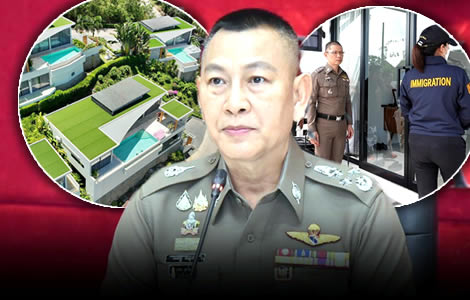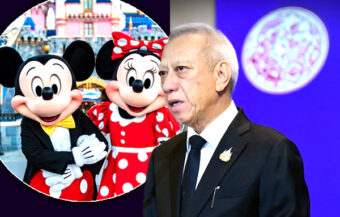Thailand’s police launch a sweeping crackdown on foreign-controlled villas on Koh Samui and Koh Phangan, targeting nominee companies hiding illegal ownership, exploiting locals, and manipulating the booming luxury property market across the islands.
Thailand’s National Police Chief, General Kittirat Phanphet, has launched a sweeping crackdown on the rampant use of Thai nominee companies to buy and develop luxury property on Koh Samui, calling it a web of corruption that’s hijacked the island’s real estate market. For years, foreign investors have exploited loopholes to seize control of land, hide behind fake Thai shareholders, and cash in on the tourism boom. The investigation—now expanding to Koh Phangan—aims to dismantle these illegal networks once and for all.

For decades, Koh Samui has dazzled foreign tourists with its beaches, luxury villas, and dreamlike lifestyle. Many visitors fall in love with the island and decide they want more than a holiday. They want to stay. They want to own a piece of paradise.
As a result, property prices have surged and hillside villas now dominate much of the landscape. However, behind this postcard beauty lies a murky business network powered by greed, deception, and legal manipulation. What once looked like an island of opportunity is now under the harsh glare of a national police investigation.
Over the past year, Thai authorities have intensified their crackdown on illegal land ownership schemes involving foreigners. These schemes often rely on Thai “nominees” who front as majority shareholders in companies secretly controlled by foreign investors. The method, though well known, violates Thai company and land ownership laws. For years, it was ignored or quietly tolerated. Now, that era is ending.
Police intensify island property probe as foreign nominee ownership faces unprecedented scrutiny
National Police Commissioner General Kittirat Phanphet has ordered a sweeping inquiry into property ownership on Koh Samui and neighbouring Koh Phangan. He says foreign control through nominee structures is no longer acceptable. “We will enforce the law strictly,” he declared last week. “Thailand’s economic stability depends on it.”
Assistant Commissioner-General and police spokesman Police Lieutenant General Yingyot Thepchamnong confirmed the move on October 10. He said the Royal Thai Police views the nominee problem as a national threat. “This practice undermines our laws and allows outsiders to control our land,” he explained. “That cannot continue.”
Accordingly, Provincial Police Region 8 and the Immigration Bureau have been ordered to work with local and national agencies. These include the Surat Thani Governor’s Office, the Department of Lands, the Department of Business Development, and the Internal Security Operations Command. Together, they are tracing company records, financial trails, and nominee connections that may stretch back years.
Raids reveal luxury villa schemes, dummy shareholders, and foreign control across Koh Samui and Phuket
Investigators are focusing on hundreds of companies that appear to be Thai on paper but are, in truth, foreign-controlled. Many operate hotels, tour companies, and luxury villas catering to wealthy visitors. The island’s success story, police say, has been built on a legal illusion.
The current crackdown follows a dramatic series of raids earlier this year. In February, police and immigration officers stormed seven locations across Koh Samui. The operations targeted firms accused of registering Thai nationals as dummy shareholders to mask foreign control. Authorities seized computers, documents, and bank statements.
The raids were triggered by complaints about the “Sea Breeze” luxury villa project, which local officials said was built on encroached land. Investigators found that the developer—a German national—used a local law firm to register companies under Thai names.
That firm alone helped create 167 companies for foreign investors. Their businesses ranged from real estate and restaurants to tour operations and car rentals.
Moreover, similar patterns have emerged elsewhere. In Phuket, Region 8 Police arrested 23 people, including a Chinese national accused of running nominee-controlled firms worth over ฿1 billion. These ventures included hotels, car rentals, and even an international school. Officers confiscated ฿4.1 million in cash and raided accounting offices suspected of helping conceal foreign ownership.
Four-pronged police campaign targets illegal land control, proxy ownership, and corrupt Thai facilitators
To combat these practices, police have launched a four-pronged campaign. First, they are creating joint task forces to investigate land ownership by foreign-controlled entities. Second, they are following money trails and company filings to reveal who truly owns these firms.
Third, they are working with the Ministry of Labour and the Immigration Bureau to check work permits and stamp out illegal occupations. Finally, they are pursuing criminal charges not only against offenders but also against any Thai officials or lawyers who assist them.
“This is about protecting Thailand’s sovereignty,” said Pol. Lt. Gen. Yingyot. “Foreigners are welcome to invest, but not to break our laws or exploit loopholes. We will prosecute everyone involved—without exception.”
Behind the crackdown lies a deep concern that corruption and weak enforcement have allowed the nominee system to flourish. For years, small legal firms and unscrupulous agents openly advertised “legal” company setups for foreign buyers. They charged high fees to create Thai-majority companies with fake shareholders. Those nominees were often poor locals paid a small annual retainer to lend their names. In some cases, they didn’t even know what they were signing.
Foreign investors accused of exploiting poor Thai nominees as luxury villas spread across Samui hillsides
Meanwhile, lawyers collected ongoing fees to maintain the illusion of legality. They filed company paperwork, paid token taxes, and claimed compliance. But the real control—and profit—always rested with the foreign investor.
The consequences have been severe. Koh Samui’s hillsides are now dotted with unauthorised villas, private pools, and roads carved into protected land. Water shortages and waste management problems have multiplied. Local residents, once able to buy or rent land affordably, have been priced out of their own communities.
The darker side of this business also became visible in 2024 with a case that shocked the island. A French woman, Catherine DeLacote, took her own life and left her villas—worth over ฿100 million to her Thai maid.
But the maid never inherited them. Investigators found that the properties were held under a company registered with nominee shareholders. The legal structure made it impossible for her to claim ownership, revealing how deeply flawed and exploitative the system had become.
Royal Thai Police widen investigation to dismantle foreign nominee schemes and reclaim land ownership
Now, the Royal Thai Police say enough is enough. Over the weekend, General Kittirat ordered a new round of inspections and document audits on Koh Samui and Koh Phangan. Officials are checking thousands of land titles, company registrations, and foreign work permits.
Significantly, police sources say the investigation has already uncovered multiple links between nominee companies and organised criminal networks, including groups from Israel, Russia, and China. These groups allegedly used Thai companies to hide profits, launder money, and operate unlicensed businesses.
French woman’s company assets could be seized by the Ministry of the Interior if proxies were used as shareholders
Although the probe is ongoing, authorities insist the impact will be far-reaching. “We are no longer turning a blind eye,” said one senior investigator. “This is not about targeting foreigners—it is about enforcing the law. Everyone must play by the same rules.”
Indeed, as the probe widens, many expect it will reshape Thailand’s coastal property market. Koh Samui, once a symbol of tropical aspiration, now faces a reckoning. Its beauty remains, but its reputation for legal grey zones may soon be replaced by something firmer—accountability.
For Thailand’s police and lawmakers, this is more than a local scandal. It is a test of national resolve. And for the island’s property elite, the message could not be clearer: the paradise bubble has burst, and the law is finally catching up.
Join the Thai News forum, follow Thai Examiner on Facebook here
Receive all our stories as they come out on Telegram here
Follow Thai Examiner here
Further reading:
Details of Ko Samui French woman’s ฿100 million bequest premature. Lawyers order media blackout
Mobile phone of Ukrainian woman key to the puzzle as police decide between murder or suicide
3 foreigners in Pattaya arrested for brazen flouting of the law on Saturday by swimming at a beach
3 western men arrested by Pattaya police at the ‘Pussycat Club’ on Saturday night and locked up
City area popular with foreigners to be targeted by new lockdown measures in Pattaya from Tuesday
Jail time looms for sick party animals who defied the virus state of emergency in Phuket this week
Scramble to register online for state money as banks close over the weekend to defeat the virus
Still a chance to avoid a curfew or lockdown if the public stays at home over the coming 7 days


















